Cristiano Ronaldo and Lionel Messi have cemented themselves as two of the greatest players of all time having shattered record after record over the past 15 years. But who is the best footballer of them all?
The following article may annoy you. It may trigger you. It may make you think “how in God’s name did he get this SO wrong?!”
But maybe, just maybe, this list won’t turn out to be too wrong.
Maybe this list of the top 20 male footballers of all time will actually be more accurate than you may think.
There is a method to the following madness. The list is carefully put together, with each of the following footballers’ peaks, longevity and impact on the game taken into consideration.
Pelé won three World Cups with Brazil and scored more than a thousand goals in his career.
Diego Maradona also has a case when it comes to being the greatest player of all time, having done some extraordinary things on the football pitch.
Cristiano Ronaldo and Lionel Messi, on the other hand, have also cemented themselves as two of the greatest players of all time having shattered record after record in the past 15 years.
But who is the best of them all?
So, before you angrily tweet at me or forward this article to your friends in disgust, please bear the aforementioned in mind and try to enjoy reading about my top 20 male footballers of all time.
Honourable Mentions
Sócrates
The Che Guevara of Football.
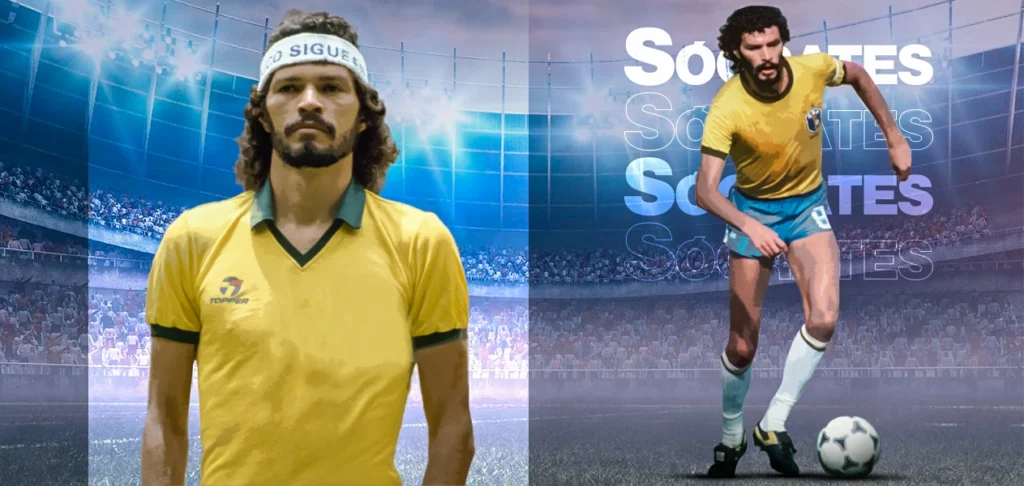
Sócrates was a Brazilian attacking midfielder and represented the Brazilian national team for seven years, scoring 22 goals, and was one of the vital cogs of the 1982 Brazil team. His medical degree and his political awareness, coupled with the flair and wizardry of his play, earned him the nickname “Doctor Sócrates”.
He captained the team in the 1982 FIFA World Cup and played alongside Zico, Falcão, Toninho Cerezo and Éder, which is why that team is understandably considered one of the greatest Brazilian national teams ever. Sócrates is considered to be one of the greatest midfielders of his generation. In 2004, he was named by Pelé in the FIFA 100 list of the world’s greatest living players.
Sir Bobby Charlton
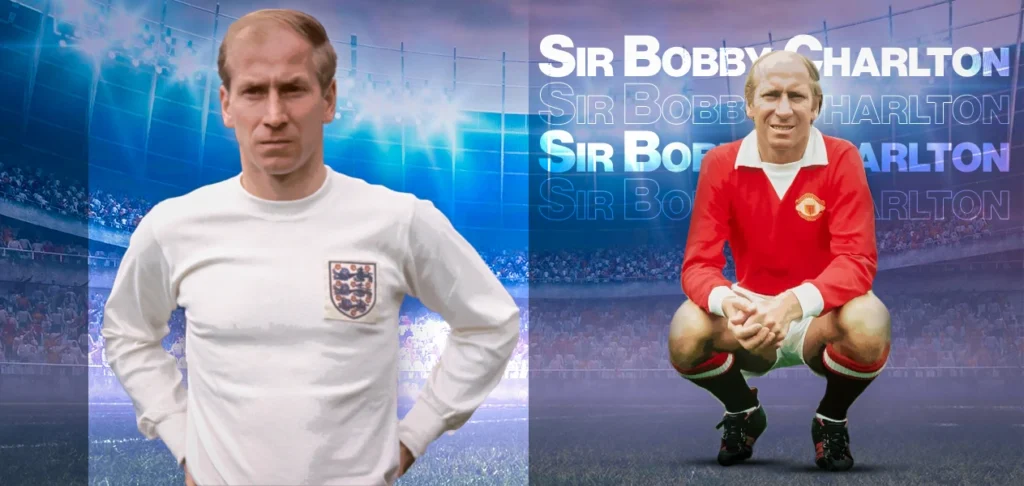
Considered one of the greatest English players of all time, Sir Robert “Bobby” Charlton was one of the chief architects of the 1966 World Cup-winning side.
Remember how good Frank Lampard was?
Yeah?
Great.
Sir Bobby was like Frank Lampard, only one hundred times better.
He spent almost the entirety of his club career playing for his beloved Manchester United, winning three First Division titles, the 1962/63 FA Cup and the 1967/68 European Cup. But most importantly, he won England their one and only World Cup in 1966, along with the 1966 FIFA World Cup Golden Ball, while he also won the Ballon d’Or that same year for his outstanding performances for club and country.
Andrés Iniesta
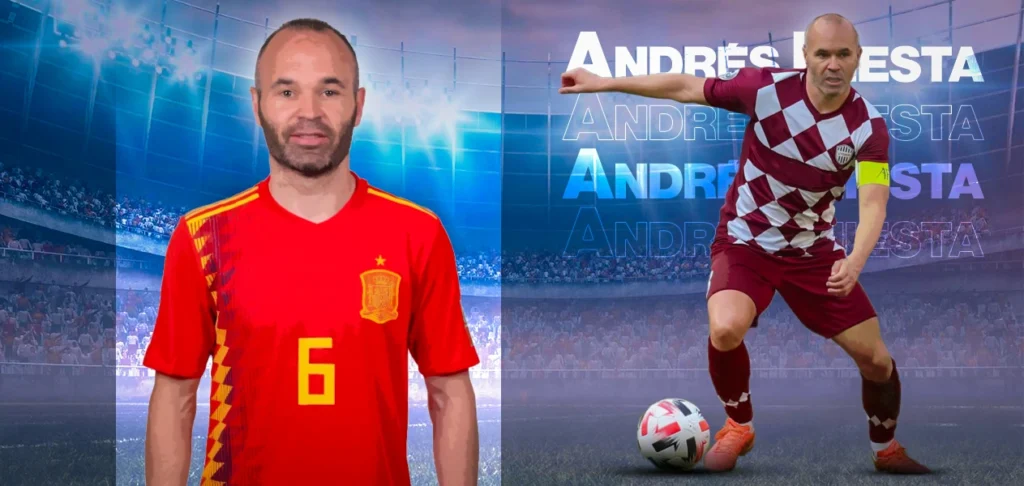
Arguably the greatest Spanish midfielder of all time, Andrés Iniesta is one of the most skilful players to have ever kicked a football. The Spanish magician came through La Masia, Barcelona’s youth academy. He made his first-team debut in 2002 at the age of 18, and till 2018, he was one of the most instrumental pieces in Barcelona’s dominance of European football.
Iniesta was an integral part of the Barcelona side that won two historic trebles in 2009 and 2015, and his 35 trophies, which include 9 LaLiga titles and 4 Champions League titles, make him the most decorated Spanish footballer of all time. Moreover, he was key to Spain winning two European Championships (2008 and 2012) and the 2010 FIFA World Cup, with him recording Man of the Match performances in all three finals of those competitions.
Karl-Heinz Rummenigge
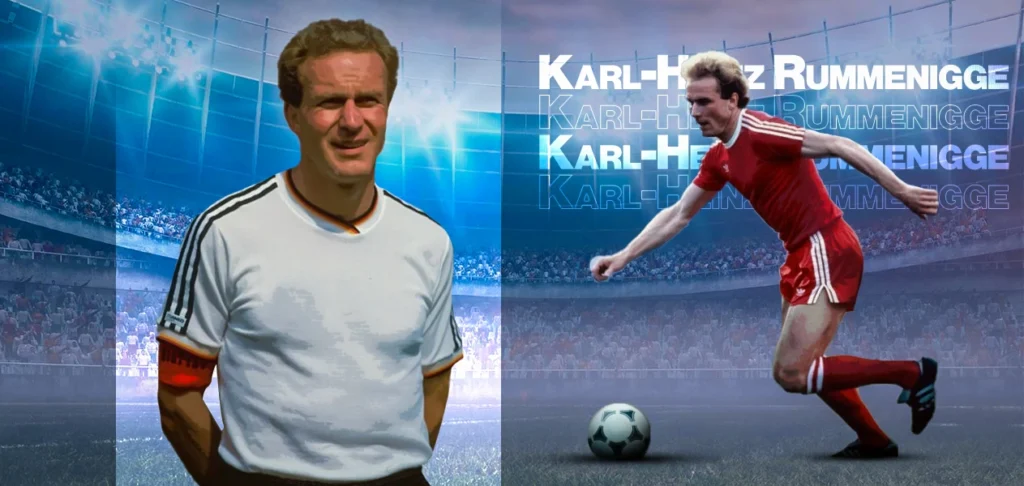
A member of the West Germany national team that won the 1980 European Championship and finished runners-up in the 1982 FIFA World Cup and at the 1986 FIFA World Cup, Karl-Heinz Rummenigge was one of the most talented forwards of his generation. Rummenigge was often lauded as a highly-versatile forward capable of operating as a second striker, a winger, a flat-out centre-forward, or a traditional number 9.
Rummenigge enjoyed his greatest career success with the German giants Bayern Munich. He won two league titles, two domestic cups, two European cups as well as the Intercontinental Cup. He was also honoured twice with the European Football of the Year award.
Gianluigi Buffon
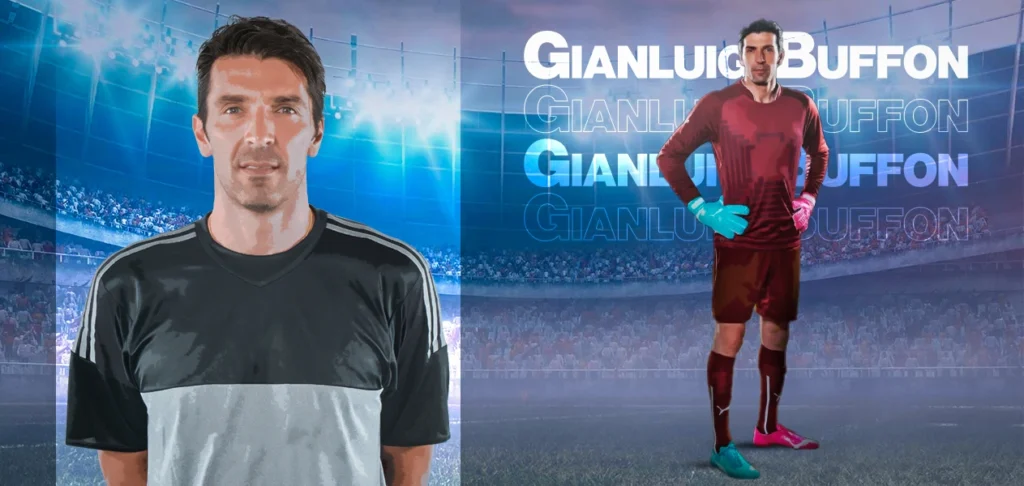
Gigi Buffon is widely regarded as one of the greatest goalkeepers of all time, and by some as the greatest ever. At 43, Gianluigi Buffon is still going strong with Serie B club Parma. His professional career began with Parma in 1995, and he instantly earned the reputation as one of the most promising young goalkeepers in Italy.
The Italian legend has won a record 10 Serie A titles, 6 Coppa Italia titles and 7 Supercoppe Italiane. He played a key role in Italy winning the 2006 FIFA World Cup by keeping a record five consecutive clean sheets. He is also the only goalkeeper to win the UEFA Club Footballer of the Year award.
The Top 20 Best Footballers of All Time
#20 Ferenc Puskás
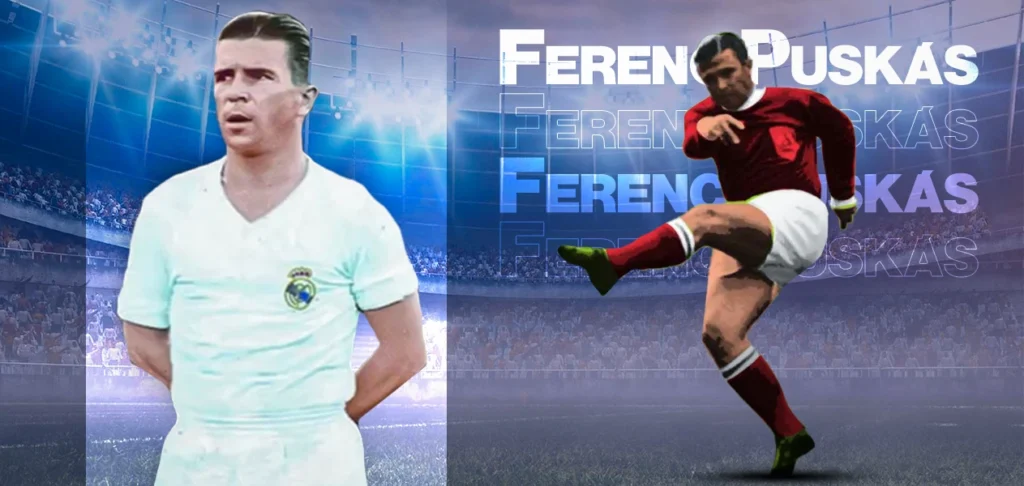
Hungarian footballer and manager Ferenc Puskás takes the 20th spot on my list. Puskás is still widely regarded as one of the greatest strikers of all time. He scored 163 goals in 123 international matches for Hungary and played four internationals for Spain as well. He also scored 514 goals in 529 league appearances in club football.
During the 1950s, Puskás was both a prominent member and captain of the Hungarian national team, who were known as the Mighty Magyars. He led the Hungarians to their first and only FIFA World Cup final in 1954, while he won ten league titles (five Hungarian top division and five Spanish Primera División), three European titles and eight individual scoring honours in club football. In 1995, he was recognised as the greatest top division scorer of the 20th century by the IFFHS. With 806 goals scored in 793 official games during his career, he is still the fourth-top goalscorer of all time.
#19 Lothar Matthäus
Lothar Matthäus is a legend. Sadly, a forgotten one.
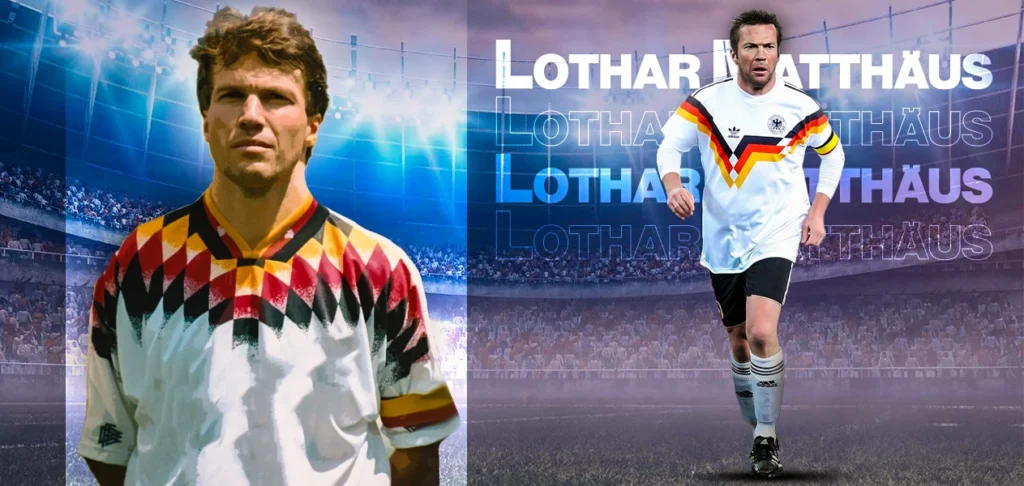
Matthäus led West Germany to victory in the 1990 FIFA World Cup and was later awarded the Ballon d’Or that year. In 1991, he was named the first FIFA World Player of the Year and remains the only male German footballer to have ever received the accolade to date. Matthäus was a key part of Germany’s golden generation that finished runners-up in the previous two World Cups (1982 and 1986) prior to winning the 1990 title.
A versatile and complete player, Matthäus was renowned for his penetrative passing, positional awareness, excellent tackling as well as crisp and powerful shooting. In his heyday, Matthäus played as a box-to-box midfielder, while during the latter stages of his career he played as a sweeper, famously taking the 1999 German Football of the Year award at the age of 38.
#18 Ruud Gullit
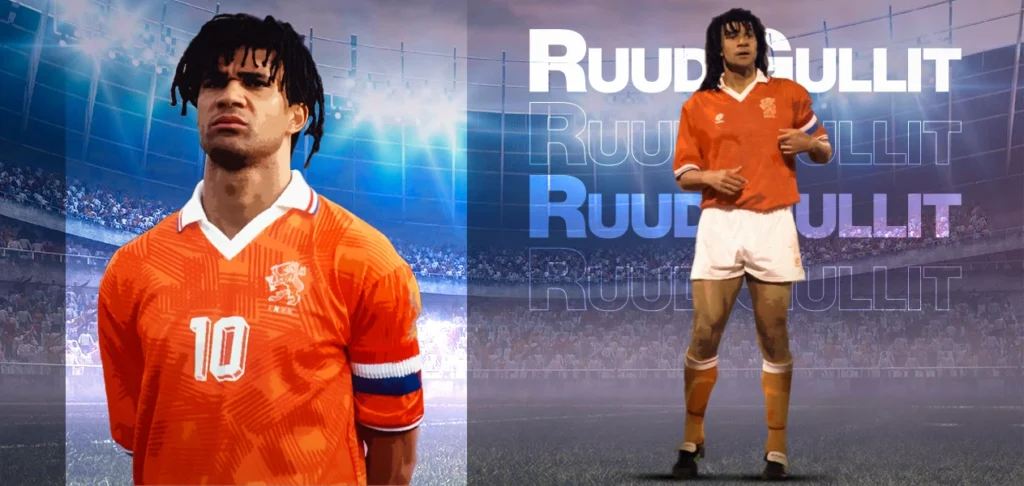
A complete and versatile player, Ruud Gullit epitomised the ethos of Total Football in every sense. Gullit was naturally adept in several positions and was capable of aiding his team defensively as well as offensively due to his work rate, ball-winning abilities, and tactical intelligence in addition to his skill and physical qualities.
Yet, unusually for a man of his stature, Gullit was an elegant player, who also possessed outstanding natural balance, poise, technical ability, and dribbling skills, which gave a graceful style to his game. He was a leader of men and led the Netherlands national team to the 1988 European Championships glory. He won the Ballon d’Or in 1987, while he was also named the World Soccer Player of the Year in 1987 and 1989.
#17 Paolo Maldini
Il Capitano takes the 17th place on my list.
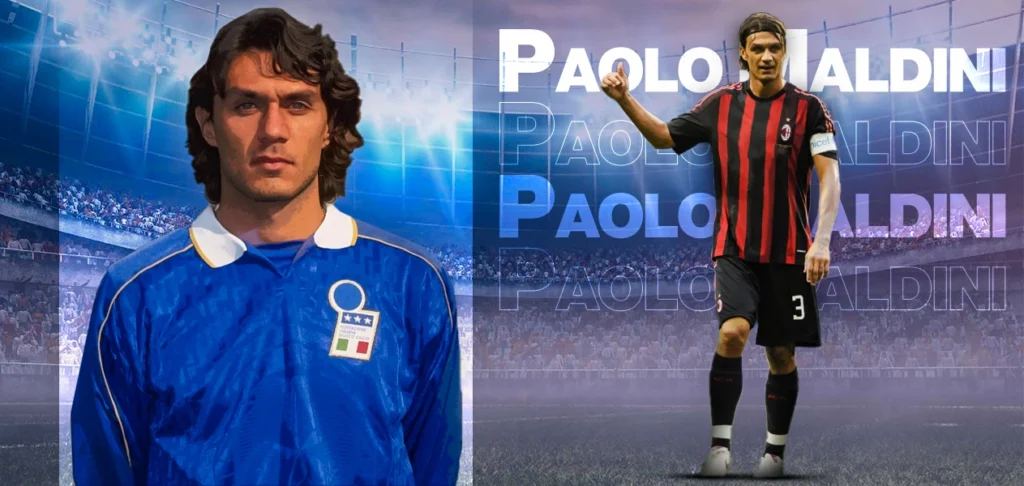
One of the greatest defenders of all time and a loyal servant of the I Rossoneri for almost a quarter of a century, Maldini had a trophy-laden career with AC Milan, winning 25 titles in as many seasons. Maldini won the European Cup/Champions League five times along with seven Serie A titles, one Coppa Italia, five Supercoppe Italiane, four European/UEFA Super Cups, two Intercontinental Cups and one FIFA Club World Cup.
Maldini was renowned for his technical ability, athleticism, sliding tackles, stamina, composure and fast energetic forward runs as a left-back or wingback. He was an excellent crosser of the ball, and was also an effective attacking threat, scoring and assisting several goals throughout his career. In the final few years of his career, as he lost speed, Maldini moved to a centre-back position where he excelled in relying on his experience, tactical ability, positioning and timing to win the ball.
#16 George Best
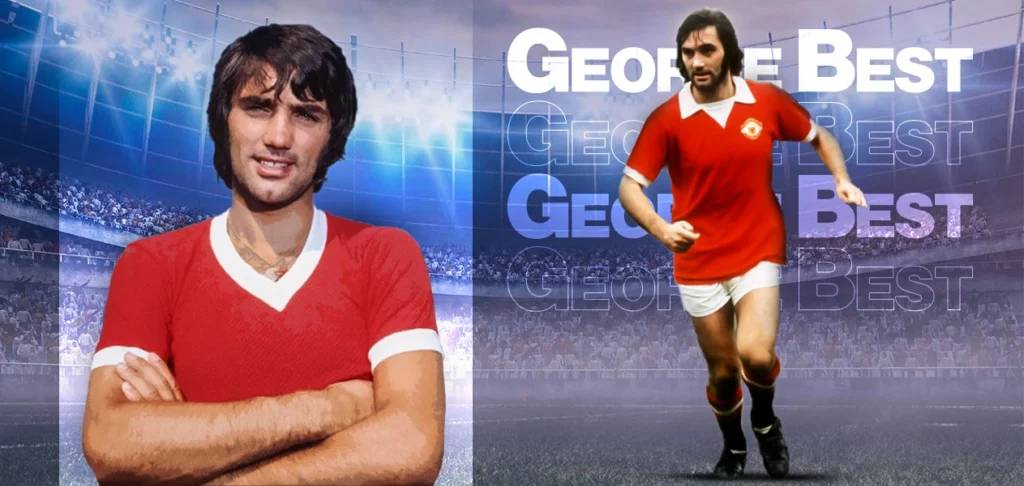
One of the greatest players to never play in a World Cup, former Manchester United legend George Best takes the 16th spot on my list. Born and brought up in Belfast, Best began his club career in England with Manchester United, with the scout who had spotted his talent at the age of 15 sending a telegram to manager Matt Busby which read: “I think I’ve found you a genius.”
After making his debut at the age of 17, Best scored 179 goals from 470 appearances over 11 years for Manchester United. A highly skilful winger, he is considered as one of the greatest dribblers in the history of the sport. Best had everything — pace, skill, balance, feints, two-footedness, finishing and the ability to get past defenders.
#15 Thierry Henry
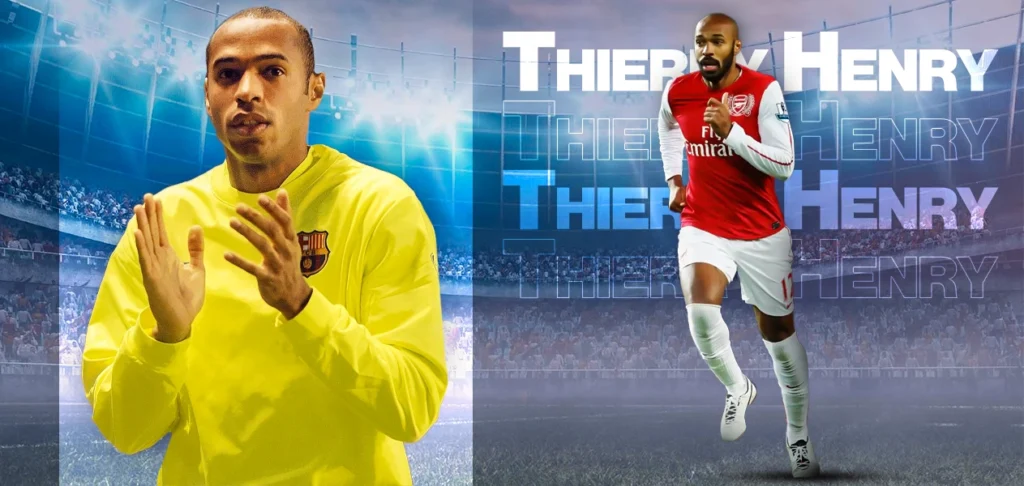
One of the greatest forwards of all time. Thierry Henry changed the definition of what a forward was capable of.
After a five-year spell with AS Monaco and a difficult period with Italian giants Juventus, Henry signed for English club Arsenal in 1999 for £11m, and that move changed the complex of both the club and the league in the coming seasons. Under the guidance of legendary manager Arsène Wenger, Henry became Arsenal’s all-time leading goalscorer with 228 goals in all competitions.
Henry won the Premier League Golden Boot a record four times, and won two FA Cups and two Premier League titles with Arsenal, including one during an unbeaten season for which the team were famously dubbed The Invincibles.
Henry moved to Barcelona in the 2006/07 season and played a crucial role in their treble-winning run in 2009. On the international front, he enjoyed sustained success with France, winning the 1998 FIFA World Cup, Euro 2000, and the 2003 FIFA Confederations Cup. Henry also finished runners-up for the World Footballer of the Year award twice in 2003 and 2004 while also finishing runners-up for the Ballon d’Or in 2003.
#14 Franco Baresi
Another AC Milan and Italian legend to feature on this list is Franco Baresi.
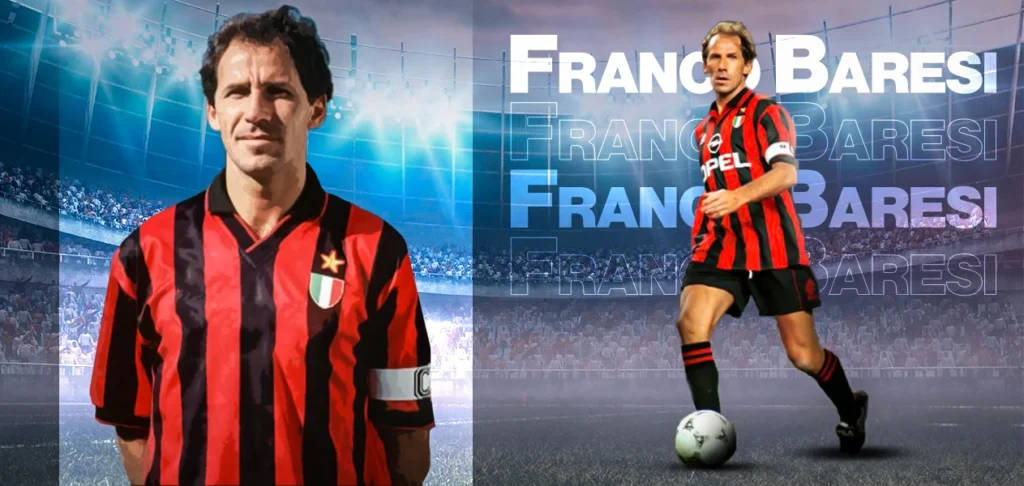
Baresi played as a sweeper, or a central defender, and spent his entire club career playing for the I Rossoneri, captaining the club for 15 seasons. He is considered one of the greatest defenders of all time and was ranked 19th in the World Soccer magazine’s list of the 100 greatest players of the 20th century.
With AC Milan, the Italian won three UEFA Champions League titles, six Serie A titles, four Supercoppe Italiane, two European Super Cups and two Intercontinental Cups. With the Italian national team, he was a member of the 1982 World Cup-winning squad, while he also played the 1990 World Cup, where he was named in the FIFA World Cup All-Star Team as Italy finished third. Moreover, at the 1994 World Cup, Baresi was handed the armband as he led his troops to the final, where they eventually lost to Brazil in a penalty shoot-out.
#13 Eusébio
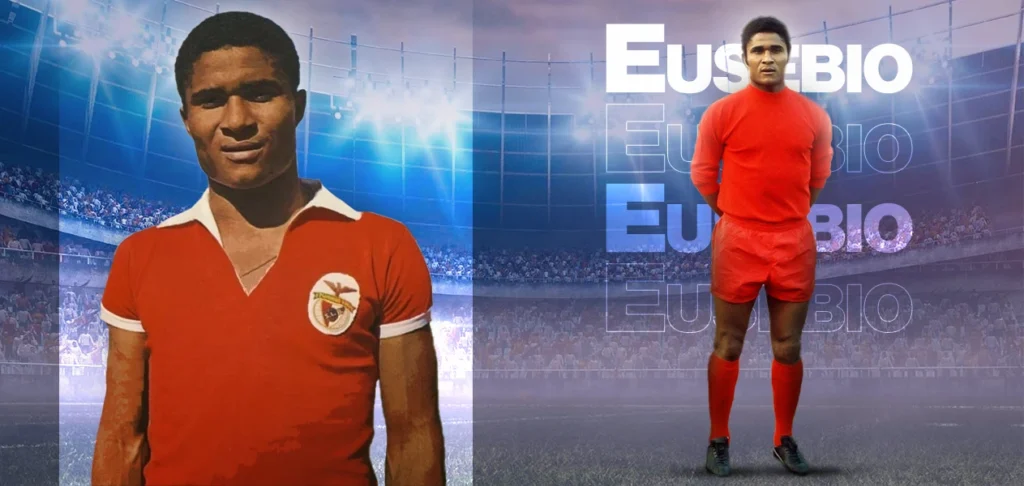
Nicknamed the Black Panther and the Black Pearl, Eusébio is considered one of the greatest footballers of all time and SL Benfica’s greatest-ever player. During his professional career, he scored 733 goals in 745 games (41 goals in 64 games for Portugal). Eusébio was known for his speed, technique, athleticism and his ferocious right-footed shots. He helped Portugal reach third place at the 1966 World Cup, being the top goalscorer of the tournament with nine goals and receiving the Bronze Ball award.
He won the Ballon d’Or for being the European Footballer of the Year in 1965 and was runner-up in 1962 and 1966.
Eusébio played for Benfica for 15 out of his 22 years as a footballer, which is why he is mostly associated with the Portuguese club and is the team’s all-time top scorer with 473 goals in 440 competitive matches. With them, he won eleven Primeira Liga titles, five Taça de Portugal titles, a European Cup (1961–62) and helped them reach three additional European Cup finals (1963, 1965, 1968). He is the eighth-highest goalscorer in the history of the European Cup and the second-highest—behind Alfredo Di Stéfano—in the pre-Champions League era with 48 goals.
#12 Ronaldo
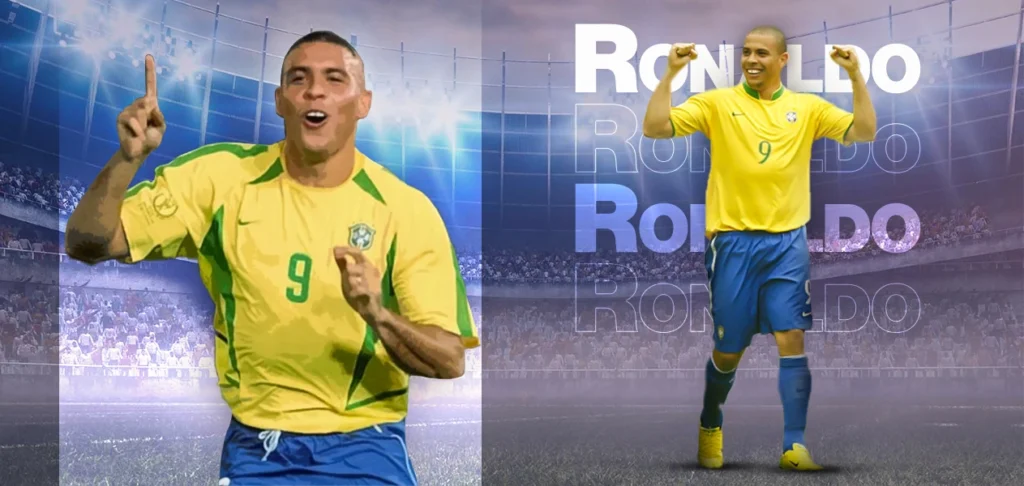
O Fenômeno holds the 12th spot on my list. Had injuries and controversies not curtailed his professional career, Ronaldo had it in him to be the best of the very best.
From 1994 to 2002, Ronaldo was an important part of the Brazil national team that won two FIFA World Cups (1994 and 2002), two Copa América titles (1997 and 1999) and the FIFA Confederations Cup in 1997. He also played key roles during the 1998 FIFA World Cup and the 1995 Copa América, where Brazil finished runners-up.
As a multi-functional striker who brought a new dimension to the position, Ronaldo has been an influence for a generation of strikers that have followed him. His individual accolades include being named FIFA World Player of the Year three times and winning two Ballons d’Or.
#11 Gerd Müller
Der Bomber or Bomber der Nation just misses out on the Top 10 list.
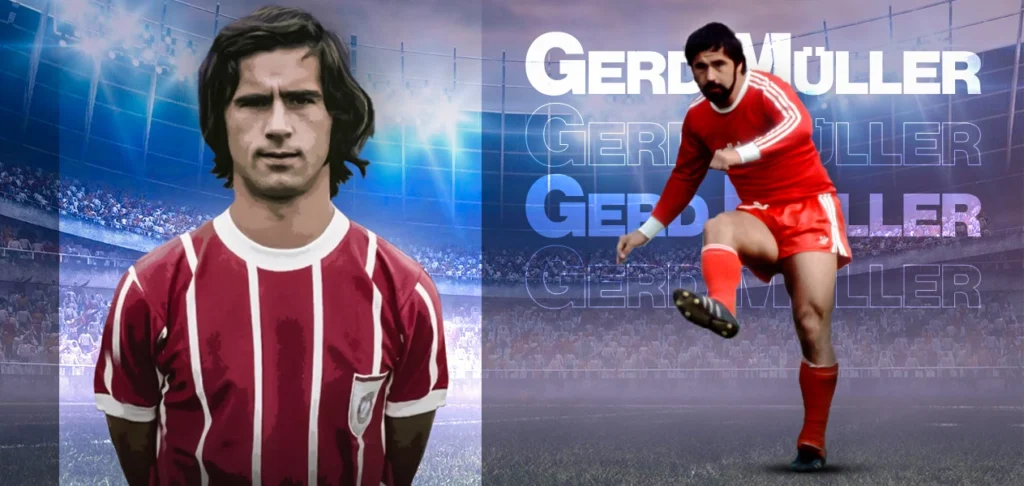
Arguably Germany’s greatest goalscorer of all time, Gerd Müller was one of the key architects of the West Germany side that ruled world football during the 1970s. At the international level, Müller represented West Germany 62 times, scoring a staggering 68 goals, while at club level, in 15 years with German giants Bayern Munich, he scored 365 goals in 427 Bundesliga matches; he became—and still is—the record holder in the league.
Gerd Müller was awarded the European Footballer of the Year award in 1970 after a successful season at Bayern Munich, while he scored 10 goals during the 1970 FIFA World Cup for West Germany, where he received the Golden Ball as the top goalscorer. In 1972, he won the European Championships with West Germany, scoring a brace in the final, while two years later, he scored four goals during the 1974 FIFA World Cup, including the winning goal in the final.
For Bayern Munich, Müller won four Bundesliga titles, four DFB-Pokals, three European Cups, one European Cup Winners’ Cup and the Intercontinental Cup.
#10 Oliver Kahn
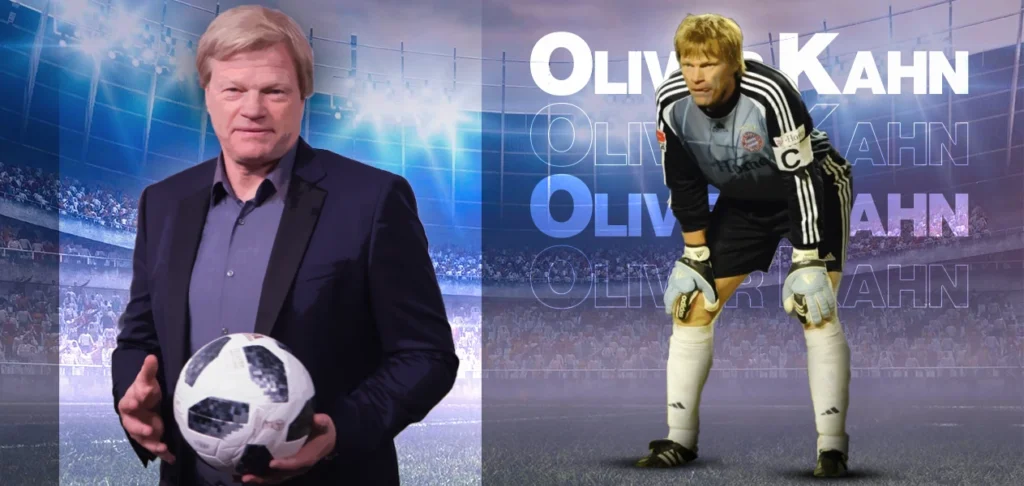
Arguably the greatest goalkeeper of all time and the man who brought the concept of sweeper keepers, Oliver Kahn takes tenth place on this list.
Kahn is one of the most successful German players in recent history, having won eight Bundesliga titles, six DFB-Pokals, the UEFA Cup in 1996, the UEFA Champions League and the Intercontinental Cup, both achieved in 2001.
Regarded as one of the greatest goalkeepers of all time, Kahn’s individual contributions have earned him a record four consecutive UEFA Best European Goalkeeper awards as well as three IFFHS World’s Best Goalkeeper awards and two German Footballer of the Year trophies. At the 2002 FIFA World Cup, Kahn became the only goalkeeper in the tournament’s history to win the Golden Ball.
In addition to his goalkeeping technique, agility, reflexes, distribution, commanding of his area, and shot-stopping abilities, Kahn is widely admired for the stamina, mental strength, and composure he showed to overcome stress and pressure over the course of his career.
#9 Alfredo di Stéfano
The man. The legend. Alfredo di Stéfano takes the ninth spot ahead of Oliver Kahn.
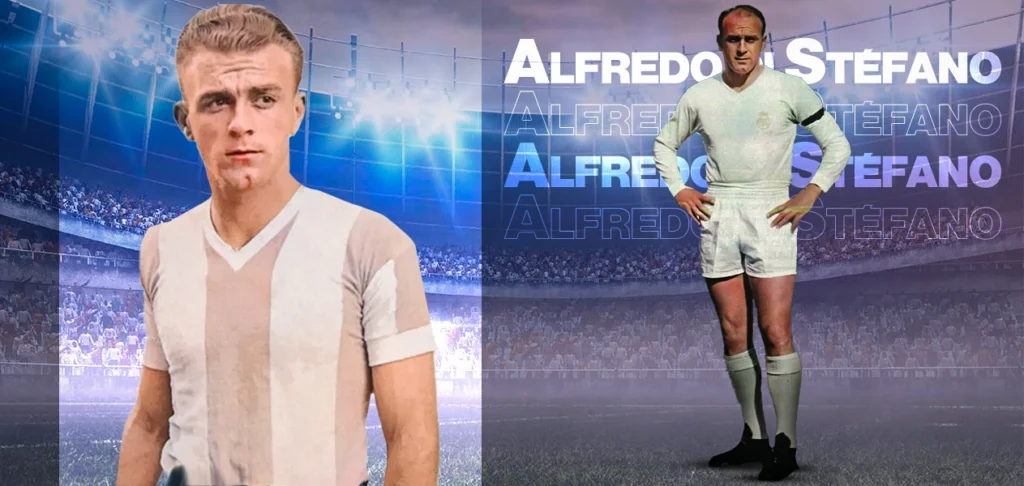
Alfredo di Stéfano is best known for his achievements with Real Madrid, where he was instrumental in the club’s domination of Europe and LaLiga during the 1950s. Along with Francisco Gento and José María Zárraga, he was one of only three players to play a part in all five European Cup victories, scoring goals in each of the five finals.
Alfredo di Stéfano spent the first 12 years of his professional club career in Argentina and Colombia, playing for clubs like River Plate, Huracán and Millonarios, winning six league titles. However, following his move to Real Madrid, he became integral to one of the most successful teams of all time. He scored 216 league goals in 282 games for Real Madrid and was crucial in all five of his club’s European Cup victories, scoring goals in each of the five finals, most memorably a hat-trick against Eintracht Frankfurt in the 1960 final. He was also awarded the Ballon d’Or for being the European Footballer of the Year in 1957 and 1959.
#8 Zinedine Zidane
Perhaps the greatest French footballer of all time.
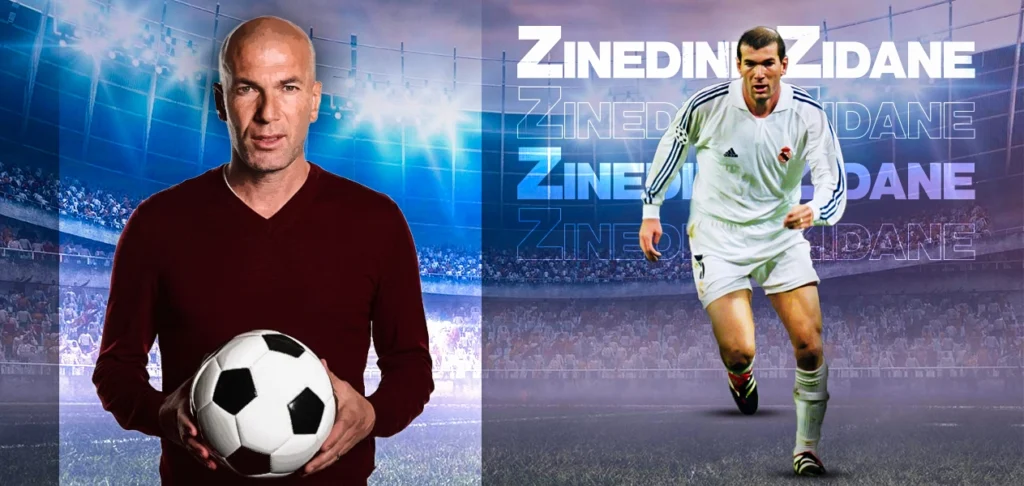
Zinedine Zidane is only one of eight male footballers to have won the World Cup, the Champions League and the Ballon d’Or.
Zidane started his career in Cannes before establishing himself as one of the brightest French talents in Ligue 1 at Bordeaux. He moved to Turin to join Juventus in 1996 and won many trophies including two Serie A titles, one Supercoppa Italiana, one UEFA Super Cup and the Intercontinental Cup before winning the 1998 FIFA World Cup at home, producing scintillating performances throughout the tournament, which also won him the 1998 Ballon d’Or.
Zidane then went on to win the 2000 European Championships with France before joining the Spanish giants Real Madrid for a then-world-record fee of €77.5m. In Spain, Zidane won several trophies, including one LaLiga title, the 2001/02 Champions League and the Super Cup and Intercontinental Cup in 2002. In 2004, Zizou was named the Best European Footballer of the past 50 years by UEFA Golden Jubilee Poll, while he also won the Golden Ball (Player of the Tournament) at the 2006 FIFA World Cup, although he is better known for headbutting Italy’s Marco Materazzi in the chest in the final.
#7 Mané Garrincha
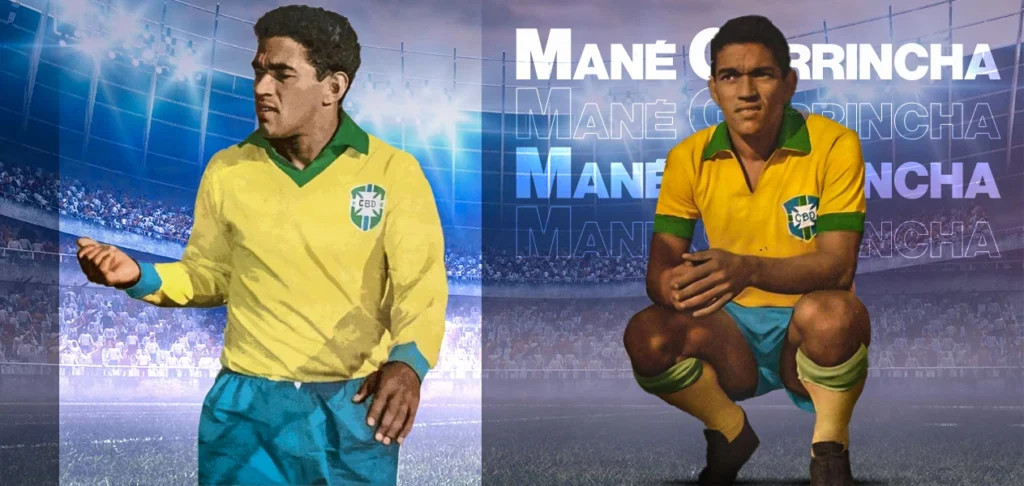
Mané Garrincha was instrumental in Brazil winning the 1958 and 1962 World Cups, which was more evident in 1962 when Pelé got injured and Garrincha led the Brazilian national side to a World Cup victory with dominating performances throughout the tournament. He also became the first player to win the Golden Ball, the Golden Boot and the World Cup in the same tournament.
An explosive, agile and diminutive right-winger with impeccable balance and control, Garrincha is renowned for his pace, creativity, ability to dictate the tempo, as well as his remarkable ball control, technique, flair, imagination, dribbling skills and feints on the wing, which enabled him to create chances out of nothing. However, it was his dribbling skills he was most famous for, a skill he retained throughout his career.
#6 Franz Beckenbauer
Der Kaiser takes 6th.
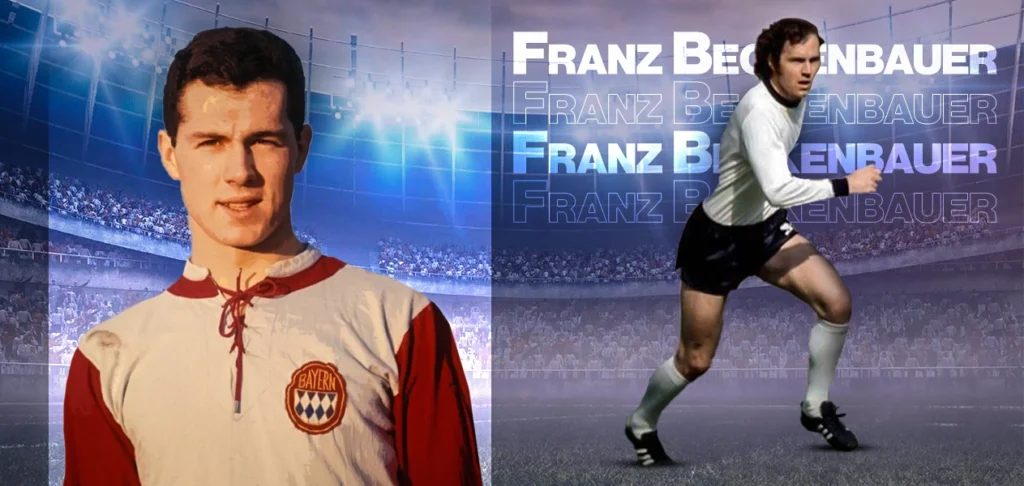
Nicknamed Der Kaiser (The Emperor) because of his elegant style, dominance and leadership on the pitch, Franz Beckenbauer is widely regarded as one of the greatest players to ever grace a football pitch. A versatile player who adapted his game with time and the limitations imposed by his ageing body, Beckenbauer started out as a central midfielder but made his name as a central defender. He is often credited as having invented the role of the modern sweeper (libero).
Beckenbauer is one of three men, along with Brazil’s Mário Zagallo and France’s Didier Deschamps, to have won the World Cup both as a player and a manager. He was part of the 1966 and 1970 West Germany sides that finished runners-up and third respectively, before securing the 1972 European Championships and then the 1974 FIFA World Cup as captain.
At club level, with Bayern Munich, Beckenbauer won the European Cup Winners’ Cup in 1967 and three consecutive European Cups from 1974 to 1976—the latter making him the first player to win three European Cups as captain of a club.
#5 Johan Cruyff
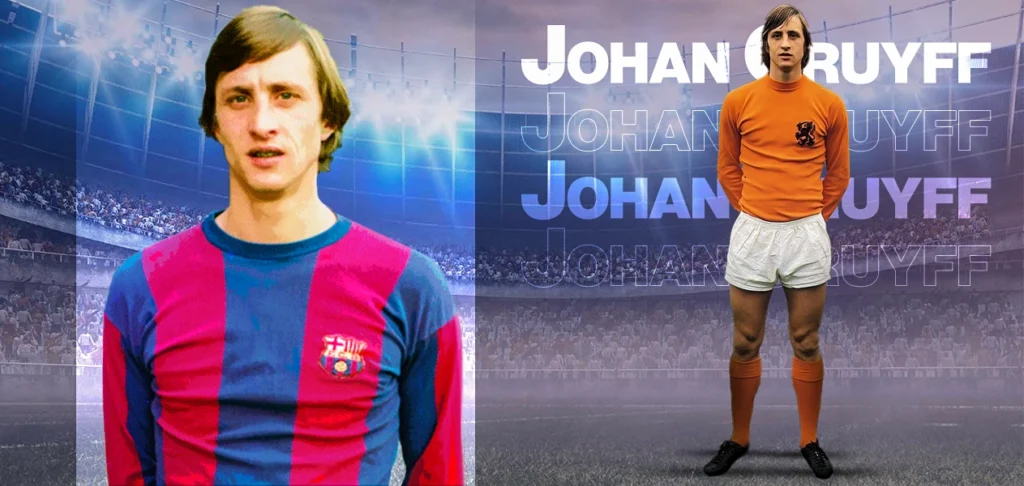
Johan Cruyff was a proponent of the football philosophy known as Total Football explored by Rinus Michels. Cruyff was vital to Dutch football’s rise during the late 1960s and early 1970s from a semi-professional and obscure level to become a powerhouse of the sport. Cruyff led the Netherlands to the final of the 1974 FIFA World Cup and received the Golden Ball as the Player of the Tournament but failed at the final hurdle. However, from 1971 to 1974, Johan Cruyff won three Ballons d’Or to establish himself as one of the greatest footballers of all time.
At club level, Cruyff started his career at Ajax, where he won eight Eredivisie titles, three European Cups and one Intercontinental Cup. In 1973, following his second Ballon d’Or, Cruyff moved to Barcelona for a world record transfer fee, helping the team win the LaLiga title in his very first season. He was then named the European Footballer of the Year and the Ballon d’Or winner for 1974.
Cruyff epitomised the ethos of Total Football like no other, both on and off the pitch; a feat so incredible that we still see its effects to this day.
#4 Cristiano Ronaldo
The Phenom, Cristiano Ronaldo, is 4th on my list.
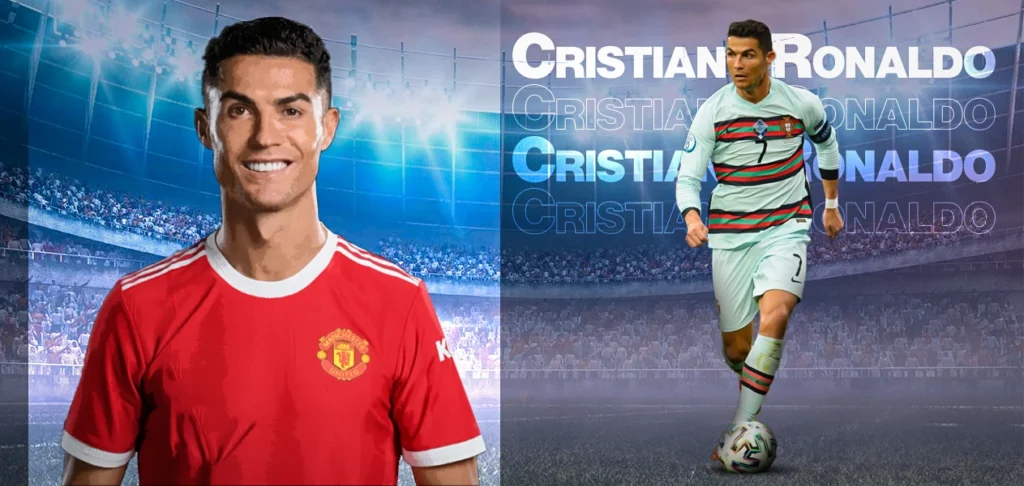
Often considered as the best player in the world and widely regarded as one of the greatest of all time, Ronaldo has won five Ballons d’Or and four European Golden Shoes—the most by any European Footballer. He has won 32 trophies in his career, including seven league titles, five UEFA Champions League titles, one Euros title (2016) and the UEFA Nations League (2019).
Ronaldo holds the records for most appearances, most goals and most assists in the Champions League, most goals in the European Championships, most international goals by a male player, and most international appearances by a European male player.
Tactically, Ronaldo has undergone several evolutions throughout his career. At Sporting, and during his first season with Manchester United, he was predominantly deployed as a traditional right-winger. In his final seasons at Manchester United and the initial years of his Real Madrid career, he operated on the left flank, often cutting inside and taking positions centrally to finish off attacking plays.
As Ronaldo matured, he underwent a major physical transformation, developing a muscular body type that allowed him to retain possession of the ball under pressure, and strong legs that enabled an outstanding jumping ability. His strength and jumping ability, combined with his height and heading accuracy, have made him one of the most prolific target-men in the game.
#3 Lionel Messi
A magician, a wizard, or both.
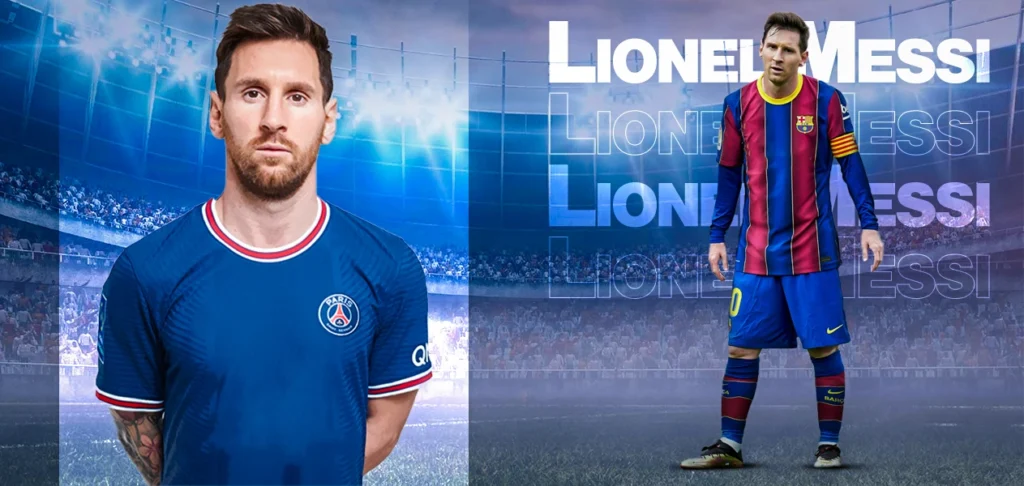
The man with 7 Ballons d’Or and a worldie of a left foot that has mesmerised people for nearly two decades, and a prolific goalscorer, Lionel Messi is known for his finishing, positioning, quick reactions, and ability to make attacking runs to beat the defensive line. Due to his short stature, Messi has a lower centre of gravity than taller players, which gives him greater agility, allowing him to change direction more quickly and evade opposing tackles.
Before joining Paris Saint-Germain on a free transfer last summer, Messi spent his entire professional club career playing for Spanish giants FC Barcelona. He won a club-record 35 trophies, including ten LaLiga titles, seven Copas del Rey and four UEFA Champions League titles among many others.
Messi holds the records for most goals in LaLiga, most goals in a LaLiga or European league season (50), most hat-tricks in LaLiga and the UEFA Champions League, and most assists in LaLiga, most assists in a LaLiga season and the Copa América. He also holds the record for most international goals by a male South American player.
Besides, Argentina’s latest World Cup triumph, where the 35-year-old magician cast his spell and galvanised the whole team to end his nation’s 36-year-long wait, along with being awarded the FIFA Golden Ball for the second time, finally settled the debate between him and CR7. However, for me, the likes of Pelé and Diego Maradona are class above, and hence Messi takes third place in this list.
Ronaldo in fourth, Messi in third. A recipe for disaster, some would say. Moreover, since such rankings are subjective, so I would love to know who you guys have in your Top 20 lists.
#2 Pelé
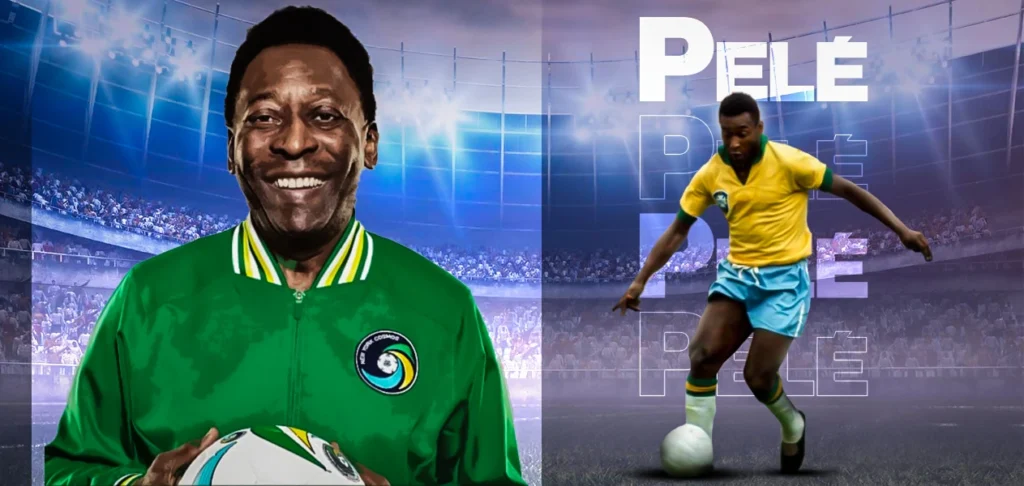
Labelled “the greatest” by FIFA and named the Athlete of the Century by the International Olympic Committee, Edson Arantes do Nascimento, known as Pelé, takes second place on my list.
Bursting onto the scene as a 17-year-old looking to avenge the tears of his father when Brazil lost the 1950 World Cup final, Pele would go on to win the World Cup on three separate occasions and make Brazil the footballing nation.
His impact was arguably greater off the field, with Barney Ronay writing, “With nothing but talent to guide him, the boy from Minas Gerais became the first black global sporting superstar, and a source of genuine uplift and inspiration.”
In 2000, Pelé was voted World Player of the Century by the International Federation of Football History & Statistics (IFFHS), and was one of the two joint-winners of the FIFA Player of the Century. His 1,279 goals in 1,363 games, which included friendlies, is recognised as a Guinness World Record.
Also Read – Pelé passes away
#1 Diego Maradona
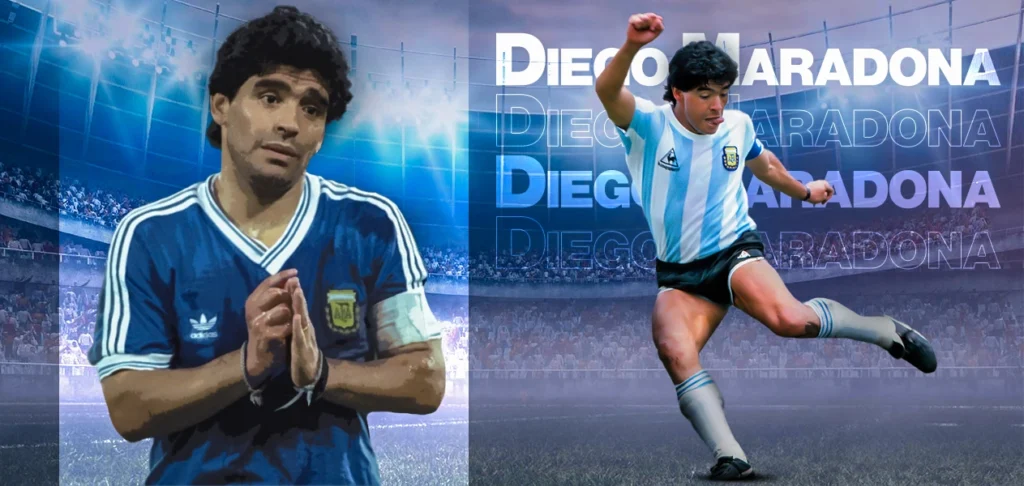
So what makes Diego Armando Maradona the greatest footballer of all time?
Is it the fact that he won the FIFA World Cup in a way that no one else has ever been capable of doing — single-handedly?
Or is it the fact that he joined SSC Napoli — a downtrodden, unwanted, unfancied team — and made them the best team in the strongest league Europe had ever seen at the time?
It’s both of them, and then some.
A precocious talent, Maradona was given the nickname El Pibe de Oro (The Golden Boy), a name that stuck with him throughout his career. Maradona’s vision, passing, ball control, and dribbling skills were combined with his small stature, which gave him a low centre of gravity allowing him to manoeuvre better than most other players.
Maradona played in four World Cups, including the 1986 World Cup in Mexico, where he captained Argentina and led them to victory over West Germany in the final, and won the Golden Ball as the tournament’s best player, while the Argentina national team for the 1990 FIFA World Cup had no right to make it to the final, but it did, thanks to Maradona once again, but this time they came short against the same West Germany side they had beaten four years earlier.
Diego Maradona, at his very best, is the greatest footballer we have, and will ever see. Effective and exceptional in equal measure.
Also Read – THE LEGACY OF DIEGO MARADONA
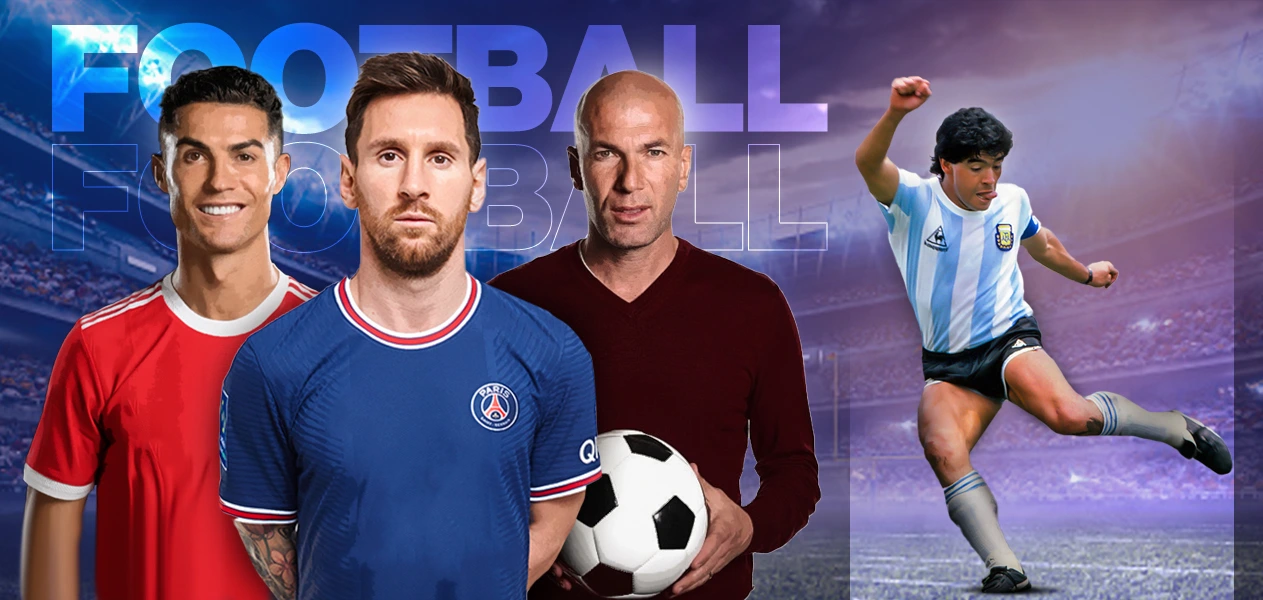


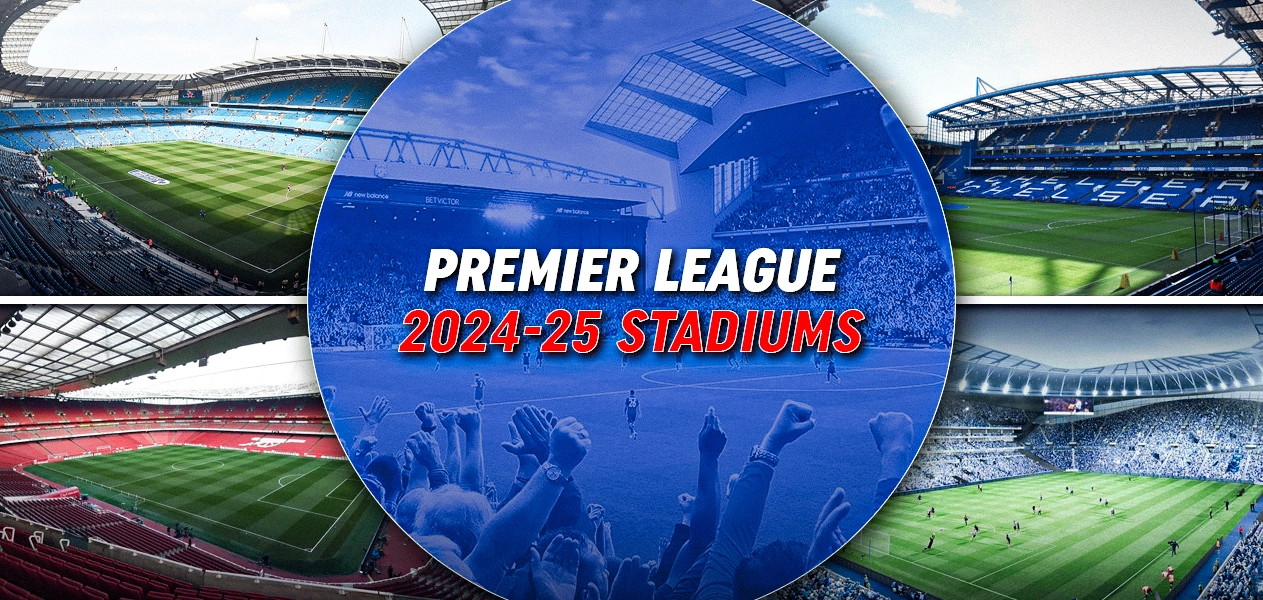
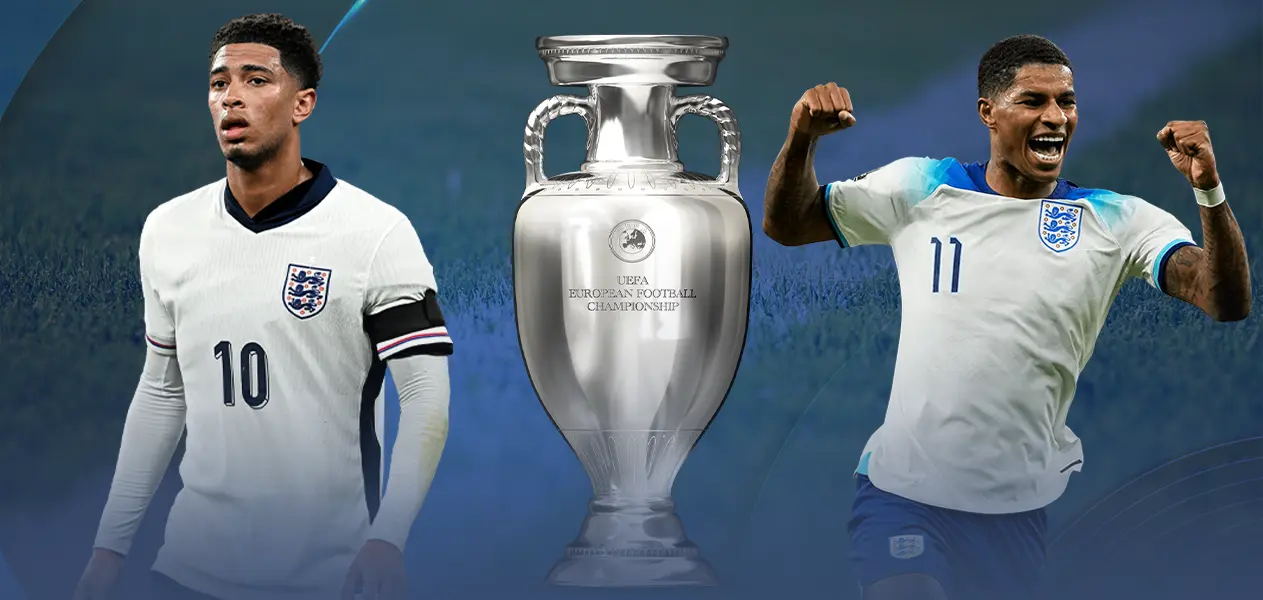

Leave a Reply